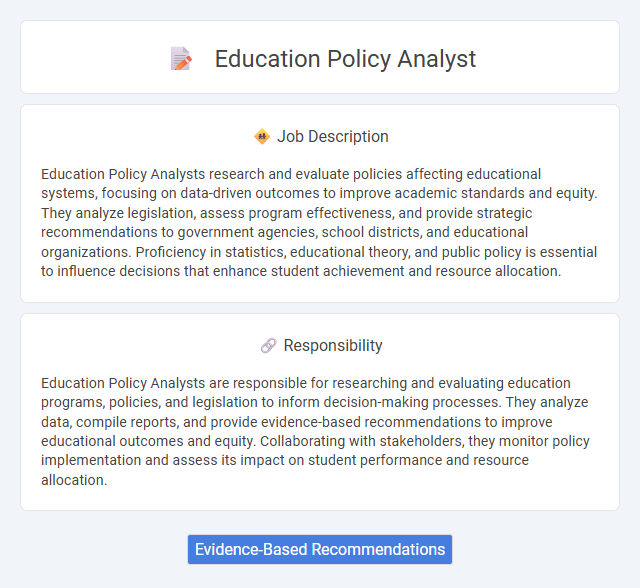
Education Policy Analysts research and evaluate policies affecting educational systems, focusing on data-driven outcomes to improve academic standards and equity. They analyze legislation, assess program effectiveness, and provide strategic recommendations to government agencies, school districts, and educational organizations. Proficiency in statistics, educational theory, and public policy is essential to influence decisions that enhance student achievement and resource allocation.
Individuals with strong analytical skills and a passion for data-driven decision-making are likely suitable for the role of an Education Policy Analyst. Those comfortable interpreting complex policy documents and conducting research may find this job aligns well with their abilities. People who prefer collaborative environments and can communicate policy implications effectively to diverse stakeholders may have a higher probability of success in this position.
Qualification
Education Policy Analyst positions typically require a master's degree in education, public policy, or related fields, emphasizing strong analytical and research skills. Proficiency in data analysis software such as SPSS, STATA, or R is essential for evaluating educational programs and policies. Experience in policy development, along with excellent communication skills, supports effective collaboration with stakeholders and presentation of findings.
Responsibility
Education Policy Analysts are responsible for researching and evaluating education programs, policies, and legislation to inform decision-making processes. They analyze data, compile reports, and provide evidence-based recommendations to improve educational outcomes and equity. Collaborating with stakeholders, they monitor policy implementation and assess its impact on student performance and resource allocation.
Benefit
Education Policy Analysts likely provide valuable insights that inform decision-making processes in educational institutions and government agencies. Their expertise probably enhances the development of evidence-based policies that improve student outcomes and resource allocation. Employing an Education Policy Analyst may increase the probability of implementing effective educational reforms aligned with current research and community needs.
Challenge
Challenges faced by Education Policy Analysts likely include navigating complex regulatory environments and interpreting multifaceted data to inform decision-making. They probably encounter difficulties balancing diverse stakeholder interests while striving to develop equitable and effective educational policies. Data accuracy and evolving educational standards might also pose ongoing obstacles in their analysis and recommendations.
Career Advancement
Education Policy Analysts gain career advancement by developing expertise in data-driven policy evaluation, mastering legislative processes, and building strong stakeholder networks. Advancing often involves transitioning into senior analyst roles, policy advisory positions, or leadership roles in government agencies, think tanks, and educational institutions. Continuous professional development through certifications in education policy and public administration enhances promotion prospects and influence in shaping education reform.
Key Terms
Evidence-Based Recommendations
Education Policy Analysts specialize in developing evidence-based recommendations by rigorously analyzing educational data, programs, and policies to identify effective strategies for improving student outcomes. They utilize quantitative and qualitative research methods to evaluate the impact of initiatives on academic performance, equity, and resource allocation. Their insights guide policymakers in crafting informed decisions that promote sustainable, data-driven advances in education systems.
 kuljobs.com
kuljobs.com